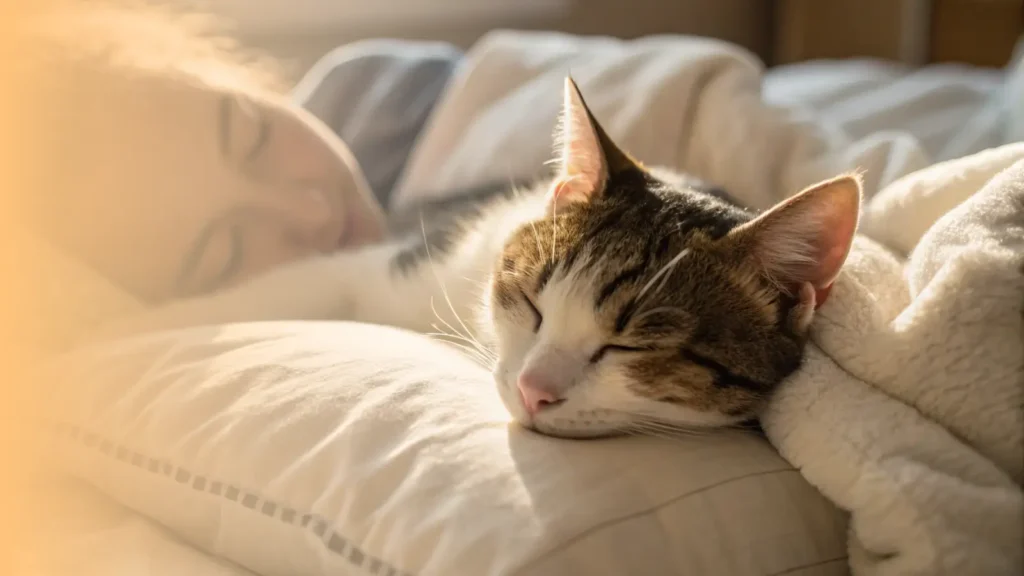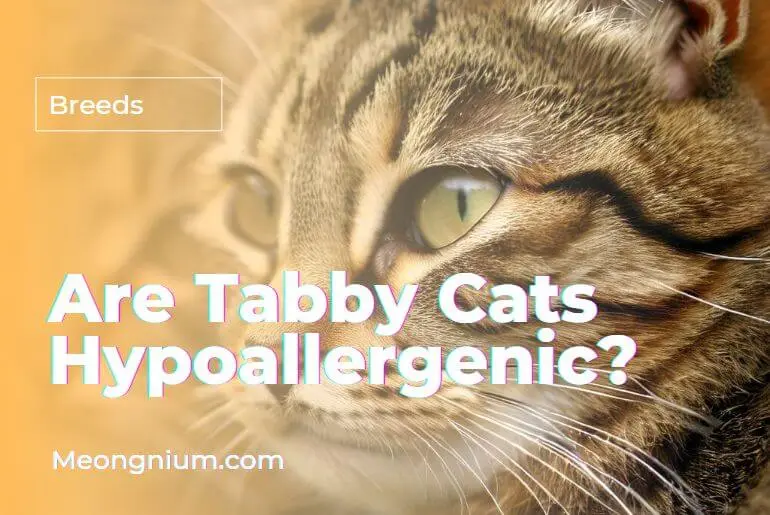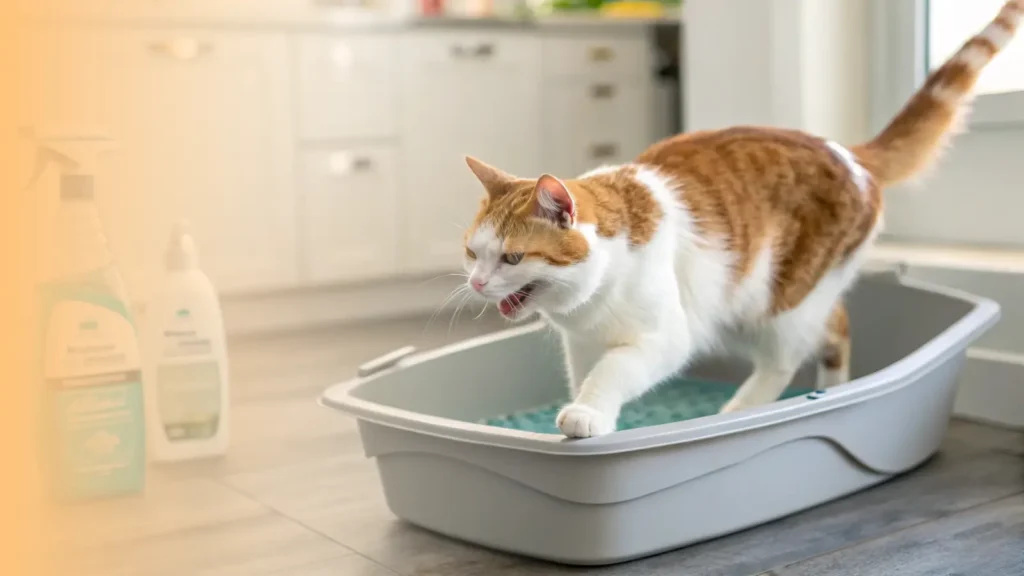Is there anything sweeter than waking up to your purring furball nestled right by your head?
Many of us cat parents know this feeling well, and it often makes us wonder just what makes our pillow the prime snoozing spot for our beloved kitties.
This common and often endearing habit is more than just a cute quirk it is a fascinating glimpse into your cat’s world.
The 6 Main Reasons Your Cat Sleeps on Your Pillow
Your cat choosing your pillow isn’t just a random act. It is a behavior rooted in their instincts, their senses, and the special bond you share. Let’s explore the top vet approved reasons why your headrest is so popular with your feline friend.
1. It is All About Warmth and Ultimate Comfort
Have you ever noticed your cat seeking out the sunniest spot in the house for a nap? Cats love warmth, and their normal body temperature is a bit higher than ours, around 38.3 to 39.2 degrees Celsius.
Your head actually gives off a good amount of heat, especially when the rest of you is tucked under blankets. This makes your pillow a wonderfully warm and inviting place.
Plus, pillows are usually soft and plush, offering a level of comfort that cats find simply irresistible. Dr. Emma Chandley, a veterinary professional, confirms that warmth is a big draw.
And let’s face it, your head tends to be pretty still when you sleep, making it a stable, undisturbed napping platform.
2. Your Scent Means Security and Familiarity
Your cat’s world revolves heavily around scent, and your unique smell is a huge source of comfort for them. Pillows are like scent sponges, full of your hair, skin oils, and even your breath.
This concentrated aroma is incredibly reassuring to your cat, signaling a safe and familiar space. Cats often rub their heads on you or objects, a behavior called allorubbing.
This is how they share scents and create a communal “family scent.” A 2021 study showed that 83 percent of cats engage in this bonding behavior when reunited with their owners.
So, when your cat sleeps on your pillow, they are surrounding themselves with your comforting scent, reinforcing your bond.
3. Your Pillow is a Throne of Trust and Safety
Sleep is a vulnerable time for any animal, and cats are no different. They have instincts of both predator and prey. When your cat chooses to sleep near your head, it is a profound display of trust.
Veterinary behaviorist Dr. Wailani Sung notes that a cat sleeping on an owner’s head shows they feel safe and see you as a protector. The bed, and therefore your pillow, is usually elevated from the ground.
This height gives them a better vantage point to survey their surroundings, an instinct from their wild ancestors who sought high places for safety.
4. It is More Than Just a Cuddle It is Affection
Sleeping so close to your face is a strong sign of affection and a desire for social connection. If your cat enjoys your company, they will often seek out physical closeness.
This behavior is similar to how kittens huddle with their mother and littermates for warmth, security, and comfort. Research even suggests that co sleeping can enhance the human animal bond and reduce stress.
A study in the Journal of Veterinary Behavior found that cats who slept with their owners showed lower stress levels. Indeed, about 64.3 percent of cats form secure attachments to their human caregivers, much like children do with parents.
5. They Might Be Claiming Their Territory (and You)
Cats are naturally territorial creatures and use scent marking to define what is theirs. Sleeping on your pillow can be a subtle way of scent marking, claiming not just the pillow but also you as part of their territory or social group.
In homes with more than one cat, the cat who snags this prime spot might be quietly signaling their “top cat” status.
This is especially true if you are seen as the primary caregiver. This coveted location also gives them a bit of a height advantage over other pets.
6. Your Pillow Can Be a Stress or Anxiety Soother
Our feline friends are sensitive to changes in their environment. Things like new pets, household moves, or even loud noises can cause stress or anxiety.
When your cat is feeling uneasy, they might seek you out for comfort. Your presence, and especially your scent, can have a wonderfully calming effect.
If you are not right there, an object saturated with your scent, like your pillow, can become a substitute source of security.
So, if your cat suddenly starts sleeping on your pillow more often, it might be a sign they are feeling a bit stressed and need some extra reassurance.
Is Your Cat’s Pillow Habit Normal or a Worry
While a cat snuggling on your pillow is usually a sweet and harmless gesture, it is good to know when this behavior might hint at something more. The key is often in noticing any sudden changes or other symptoms.
1. What is Considered Typical Pillow Snuggling
For many cats, a fondness for their owner’s pillow is a long standing habit. If your kitty has happily chosen this spot for months or years without any other concerning signs, it is generally just normal, affectionate behavior.
You will often see them purring, gently kneading (we love it when they “make biscuits”), nuzzling, or giving affectionate head butts while on or near the pillow.
These are all lovely signs of a content and secure cat. It is also perfectly normal for them to choose the pillow whether you are there or not because your lingering scent is comforting.
A little twitching of their whiskers or paws during deep sleep is also common, just them dreaming away.
2. When to Look Closer at Pillow Sleeping
A sudden change in behavior is usually the first clue that something might be up. If a cat who never cared for your pillow suddenly starts sleeping there, or a dedicated pillow sleeper abruptly stops, it is worth paying closer attention.
If this pillow preference is part of a bigger picture of them sleeping much more, being lethargic, or hiding a lot, it could be a symptom of an illness, pain, or even serious stress.
Cats are experts at hiding illness, so subtle changes in sleep can be early warnings. Also, if your cat starts sleeping in unusual spots and your pillow is one of these new, uncharacteristic places, especially if they are also hiding elsewhere, they might be feeling unwell.
Any changes in appetite, weight, grooming habits, litter box use, unusual vocalizations, or social interactions alongside new pillow habits should prompt a chat with your vet.
3. Understanding Head Pressing Versus Head Rubbing
It is super important to know the difference between normal affectionate head rubbing on your soft pillow and something called head pressing.
True head pressing is when a cat compulsively and forcefully presses its head against a firm surface, like a wall or furniture leg.
This is a serious neurological sign that could point to conditions like a brain tumor or toxic poisoning and needs immediate veterinary attention.
In contrast, a cat gently rubbing its face on your pillow or bunting its head against you is a sign of affection.
Look at the intensity of the pressure, the type of surface (firm versus soft), and whether their body seems tense or relaxed.
If your cat is pressing their head with a tense body against hard surfaces repeatedly, that is a major red flag.
Sharing Your Pillow The Good The Bad and The Furry
Deciding whether to let your cat share your pillow is a personal choice. There are definite joys and a few potential drawbacks to consider.
1. The Upsides of Co Sleeping With Your Kitty
For many of us, the benefits are huge. Co sleeping can really strengthen that special bond you share, fostering closeness and trust.
The physical proximity and those quiet shared moments are powerful. Petting a purring cat can also be incredibly calming for you, potentially lowering blood pressure and reducing feelings of stress or anxiety.
And for your cat, sleeping with their trusted human can lower their stress levels and make them feel more secure.
Plus, it is a cozy way to share warmth on a chilly night. Many owners also report feeling a greater sense of security with their pet nearby.
2. Potential Downsides to Consider
Despite the perks, there are a few things to keep in mind. If you have allergies or asthma, cat dander, saliva, and urine (which can contain allergens) can accumulate on pillows and bedding.
Close facial contact can trigger or worsen symptoms. Hygiene is another point. Cats, especially those who go outdoors or even indoor cats using a litter box, can track things onto your bedding.
While the risk is generally low with healthy pets, there is a small chance of exposure to bacteria. Your sleep might also get a bit disrupted.
Cats are crepuscular, meaning they are most active at dawn and dusk. Their playful antics or demands for food might not align with your sleep schedule.
For infants or very young children (under 4 or 5 years old), it is generally not recommended for cats to sleep with them due to unintentional suffocation risks or accidental scratches if the cat is startled.
3. A Quick Look at Co Sleeping Stats
You are definitely not alone if your cat shares your bed. Research shows that about 60 to 62 percent of cat owners in the United States let their cats sleep in bed with them.
One study by Chomel & Sun in 2011 specifically found that 62 percent of cats co sleep with their adult owners.
While some studies suggest minor sleep disruptions for owners, about 20 percent report their pets as disruptive.
Others, particularly adolescents co sleeping with pets, found no significant negative impact on their overall sleep quality.
Pillow Preferences From Kittens to Golden Oldies
A cat’s love for an owner’s pillow can be seen at any age, but the reasons might shift a little as they grow.
1. Why Kittens Love Your Head
Young kittens have a greater need for warmth because their ability to regulate their body temperature is still developing.
They instinctively look for soft, warm, secure places that feel like being snuggled with their mom and littermates.
Your pillow, radiating your body heat and offering plushness, is perfect.
Kittens often see their human caregivers as surrogate mother figures, and sleeping near your face is an expression of trust and a way to seek comfort.
Scent is also crucial for kittens, helping them feel secure, and your pillow is a scent haven.
2. Adult Cats and Their Cozy Routines
For adult cats, sleeping on your pillow is often an established, cherished routine. It is reinforced by many nights of warmth, softness, your comforting scent, and a sense of security and affection.
All the main reasons we discussed earlier usually apply to adult cats. Their individual personality and the strength of your bond also play a big role in maintaining this habit.
3. Senior Cats Seeking Comfort and Warmth
As cats reach their golden years, typically 12 to 14 years and older, their sleeping habits might change again. Senior cats tend to sleep more, sometimes up to 20 hours a day, much like kittens.
They may also develop a greater need for warmth and easily accessible, extra soft spots. This can be due to a reduced ability to regulate their body temperature or conditions like arthritis making harder surfaces uncomfortable.
Your warm, plush pillow can meet these needs perfectly. Always monitor any significant changes in a senior cat’s sleeping spots, as these can be early signs of health issues. Making sure they can easily get to their favorite spots is also important as they age.
Want Your Pillow Back Gentle Ways to Reclaim Your Space
While many of us adore those furry head cuddles, sometimes it is just not practical. If you need to redirect your cat to a different sleeping spot, gentle and consistent strategies are the way to go.
1. Creating an Irresistible Cat Bed Alternative
The key to successfully redirecting your cat is offering an alternative that is just as good, if not better. Think about what makes your pillow so attractive. Look for beds that are super soft and plush.
A heated cat bed can be a fantastic option, especially if warmth is a big motivator for your cat. Many cats also love beds with raised edges, hoods, or cave like designs because these provide a sense of security.
If your cat seems to enjoy being elevated, a bed on a nightstand or a sturdy window perch could be appealing.
Some popular choices include K&H Pet Products heated beds or the plush Best Friends by Sheri Calming Donut bed.
2. Gentle Redirection is Your Best Friend
Consistency is absolutely vital. If the pillow is off limits, this rule needs to be gently but firmly enforced by everyone in the household.
When your cat tries to settle on your pillow, calmly pick them up and move them to their designated comfy alternative.
Crucially, when they use their own bed, reward them immediately with praise, gentle petting, or a small tasty treat.
This helps them build a positive association with their own sleeping area. You can also try satisfying their need for attention with a good play session followed by cuddles elsewhere before bedtime.
3. Consider Calming Pheromones for Anxious Kitties
If stress or anxiety seems to be driving your cat’s need to be on your pillow, synthetic feline pheromones might help.
Products like Feliway diffusers release calming signals that can help your cat feel more secure and relaxed.
They will not directly stop your cat from choosing your pillow, but they can reduce the underlying stress, making your cat more open to other comfy spots.
These are often most effective as part of a larger plan that includes creating a welcoming environment.
4. Making Their Own Bed Extra Special (Location and Scent)
Where you put the new cat bed matters. Initially, try placing it near your bed, maybe on a nightstand or at the foot of your bed.
This maintains that sense of closeness your cat craves. The spot should be warm, quiet, and feel safe.
To make the new bed even more inviting, place an item of your unlaundered clothing like a t shirt or some of their own familiar bedding inside it.
This transfers comforting scents and can make a big difference in how quickly they accept their new spot.
Could Diet Affect Your Cat’s Sleep Spot Choice
It might seem like a stretch, but what and how you feed your cat can indirectly influence their desire to seek the comfort of your pillow by affecting their overall stress and well being.
1. How Food Can Influence Stress in Cats
Many commercial dry cat foods are high in carbohydrates. While cats can digest them, their natural diet is primarily protein and fat.
Diets too high in carbs might potentially lead to low grade inflammation, which can trigger a physiological stress response.
This underlying stress could make your cat seek more comfort. Also, the wrong kind of food bowl, one that is too deep or narrow, can cause “whisker fatigue.”
This happens when a cat’s sensitive whiskers repeatedly touch the sides of the bowl, causing discomfort and stress. Even sudden changes to feeding routines can disrupt their sense of security.
2. Feeding Tips for a Contented Feline
Thinking about a diet that is more species appropriate, higher in quality animal protein and lower in carbohydrates, could be beneficial. Always chat with your vet before making big dietary changes.
Ensure your cat always has fresh, clean water. If you meal feed, try to maintain a consistent schedule. Use wide, shallow food bowls to avoid whisker fatigue.
Providing food via puzzle feeders can also offer mental stimulation and reduce boredom, which itself can be a stressor. A less stressed cat may be less compelled to seek your pillow out of anxiety.
Final Thoughts
That furry head on your pillow is often a beautiful sign of the love, trust, and comfort your cat feels with you.
Understanding the many reasons behind this common behavior can deepen the incredible bond you share with your feline companion.
Whether you happily embrace the nighttime cuddles or gently guide them to their own special spot, the goal is a happy and harmonious home for both of you.







